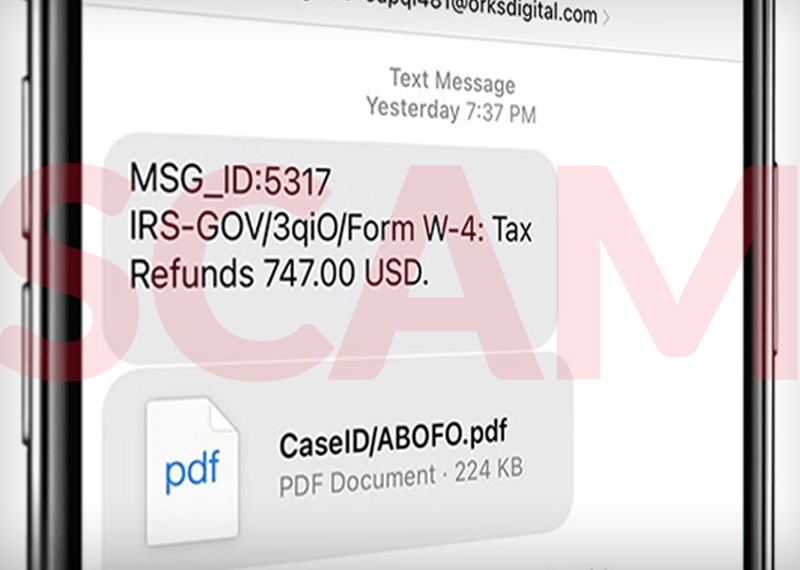Fake Government Text Messages: How They Look
Scammers send fake government text messages daily, whether they're about updates, federal grants, a potential stimulus, jobs, parking fines, tax refunds, surplus auctions, or even random student loan forgiveness. The fraudulent messages are all the same, whether you live in the United States, United Kingdom, Canada or Australia. Let me get into detail.
Most of us interact with various levels of the government for many services and amenities. Unfortunately, many unscrupulous characters have taken advantage of the potential communication with the federal authorities to scam people of their hard-earned money.
Scam Detectors Most Trusted Websites in Online Security
- Guard.io (100): Surf the web safely. Clean up your browser, remove malicious extensions and check for privacy violations.
- Incogni.com (100): Delete your personal data from the internet and protect against scams and identity theft.
- ExpressVPN (100) Stay secure and anonymous online - Best VPN Out There
Look at the screenshot below – what would you do if you receive that?

You'd click on the PDF file, right?
There has been an increased number of fake government text message scams that have threatened people lately.
Below there are 6 examples of text message scams:
1. Government Tax Refund Text
In this scam, you receive a text message claiming to be from the IRS, CRA, ATO, or HMRC regarding a tax refund. The message may inform you that the government cannot process your tax filing because someone else has done it on your behalf. This would surely frighten you and make you more susceptible to their scams. The trick is to get you to verify your identity (to prove it is the real you), meaning the scammers will steal the personal information you must fill in.
Another variation of the Tax Refund Scam may – more common via email – involve a text message consisting of a refund you apparently shall receive. To claim the receipt, you need to submit your banking information.
Last, a third variation of the scam is a text message confirming that the IRS, CRA, ATO, or HMRC will send your refund to your bank account. However, they show the last four digits of the account, but they don't match yours. Victims may panic when they don't recognize the account and input their actual number.
2. Federal Government Jobs
This scam is a letter or email informing you of different job openings around you. These are Government jobs, not other kind, so they are well-paid.
There is a phone number included in the message that you can use to get more information. When you call, you'll get put on hold for a long time. You may not be quick to hang up expecting that you'll speak to someone in government who has an employment offer for you.
After waiting a long time and repeatedly listening to the same on-hold song, you finally hang up the phone and get on with other daily activities. If you try again the next day or another, the scenario repeats: you are put on hold for an extended period.
You may eventually give up after trying to get in touch with them a few more times. In the next few weeks, you'll receive your phone bill, which notifies you that you have spent a lot of money on “premium” phone conversations (hotlines) that you know nothing about.
3. Online Pay Traffic Ticket
A new popular scam is going around, which may be in the form of a parking ticket coming from the local authorities. How does this scam work?
An unexpected text message will claim you owe parking tickets for unauthorized parking in a local parking lot. The amount charged may extend from $35 to $150. The plot is designed to take some of your money under the guise of a fake parking ticket sent electronically. If you contact the number on the text message or click the link, you may be tricked into making payments or inputting credentials.
Watch the video below to see a different variation of the parking ticket scam:
4. Government Grant Text Message
The government stimulus scam comes as a text message saying they are eligible for a grant from an economic surplus. Supposedly, the surplus comes after the crisis during the pandemic years. The message recipients are urged to visit a website where they register and input their details to determine their eligibility to receive the money.
After applying, victims get a congratulatory message that they've been accepted to receive the stimulus funds. However, there's a catch. The scammer will require that you pay a particular governmental tax to access the promised citizens' benefits. If you pay up, you won't receive financial support or get a refund on the federal tax – you lose your money.
5. Student Loan Forgiveness Programs
A fake Student Loan Forgiveness Program Scam is offered via a text message informing you of your eligibility for such a benefit. The sender will try to extract critical information from you by starting a conversation, making it look like an official offer.
The text is all in a bid to learn about your vital credentials. Victims of these scams usually provide bank accounts or credit card details. Some other people are tricked into a pre-payment to make them eligible for the offer.

6. Government Auctions
The Government Auctions Scam may take place in two variations. Scammers will organize fake online auctions and promote them via text messages and social media platforms. At these events, they trick people into paying for non-existent items. Then, they collect credit card information but not sending any goods.
Another variation of the scam is when people are lured into paying for cheap counterfeit items. These are featured as government ‘seized' goods from criminal activities that are now sold online. In reality, they are just knock-offs made for little money in Asia.
Government Text Message: How To Report a Scammer
Warn your family and friends know about these Government fake text message. Feel free to share the article if it was helpful. However, you can report scammers and any suspicious activity officially to the Federal Trade Commission (most important), the Office of the Inspector General, and the FBI Internet Complaint Center by using the pages below:
Report To The FTC
Submit Claim To The Office of the Inspector General
Report To The FBI Internet Complaints Center
How To Protect Yourself More
Do you want to receive alerts about the most notorious scams on a regular basis? Subscribe to our scam alerts. You will receive periodic emails from Scam Detector with exclusive tips. Those will include info on how to prevent fraud and insights about the newest tools you can use to fight crime.
Feel free to explore additional articles on related fraud. You can find them listed below this paragraph, so that you know more about online security. Last but not least, if you had any bad experiences, make sure to use the comments section below to expose other scammers.
Verify a website below
Are you just about to make a purchase online? See if the website is legit with our validator:
vldtr®


TOP 4 MUST-WATCH FRAUD PREVENTION VIDEOS
1. Top 5 Amazon Scams in 2024 2. Top 5 PayPal Scams in 2024 3. How To Spot a Scam Email in 2024
- Latest Posts by Selma Hrynchuk
-
Compromised Credit Card Scam
- -
Fake Google Chrome Update
- -
Facebook Privacy Notice Hoax
- All Posts














I’m very happy to have you people as my family thank you.
Mary J WALLON @ http://www.facebook.com/zagzig.saka is a scammer, also a hacker.They stole my personal information: ID, address, phone number. I did not give any bank account information. I need help.